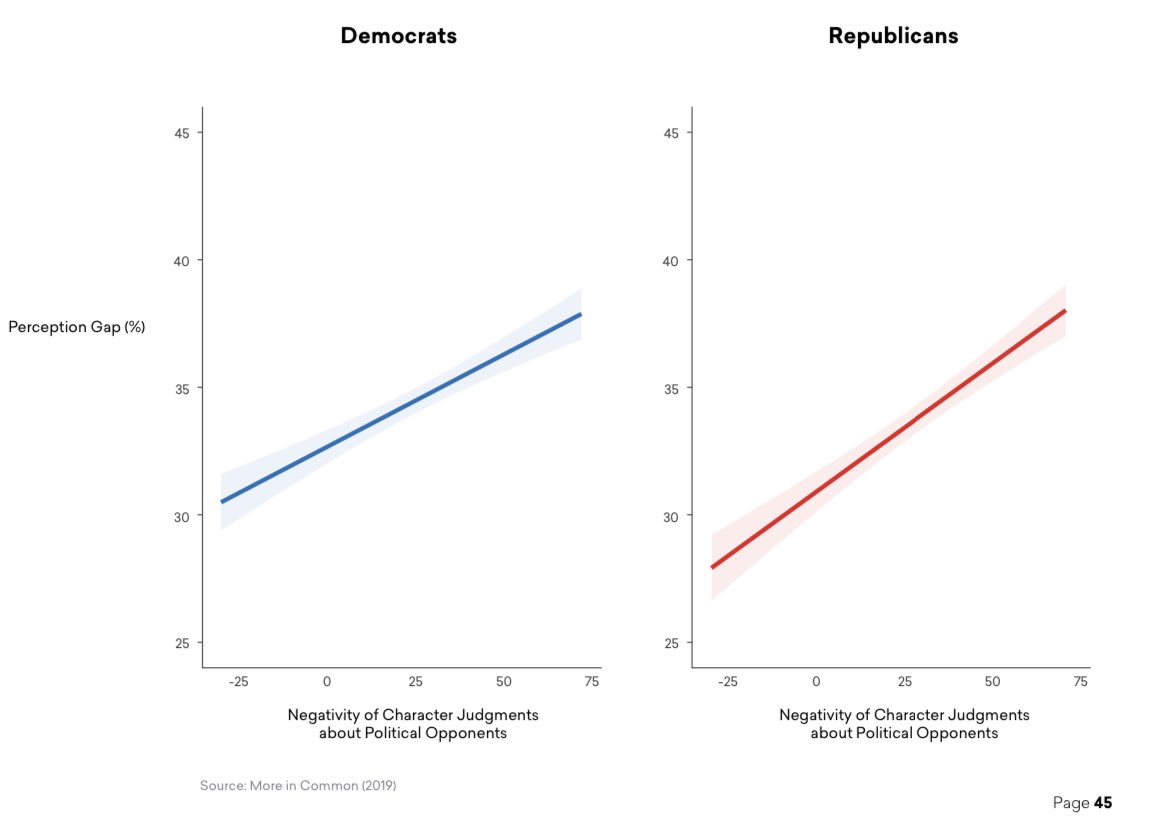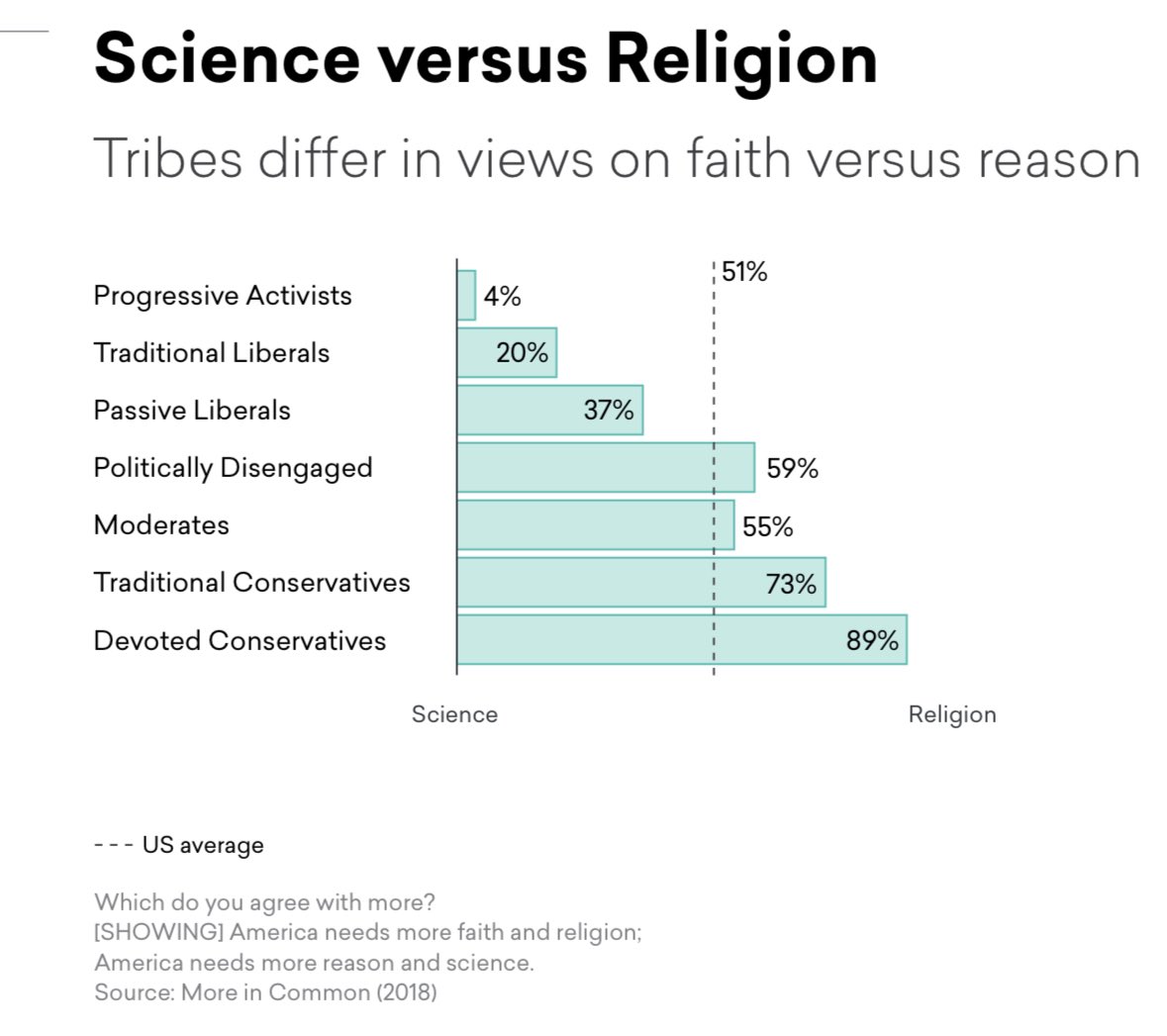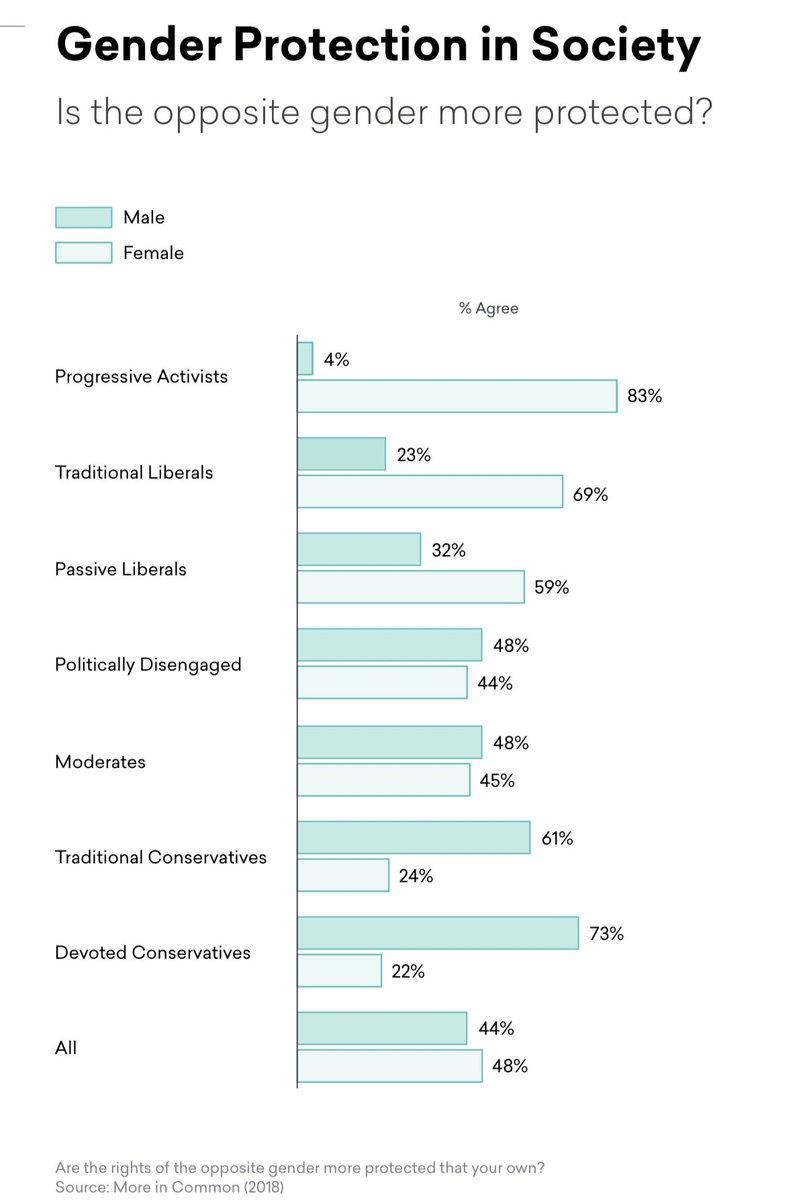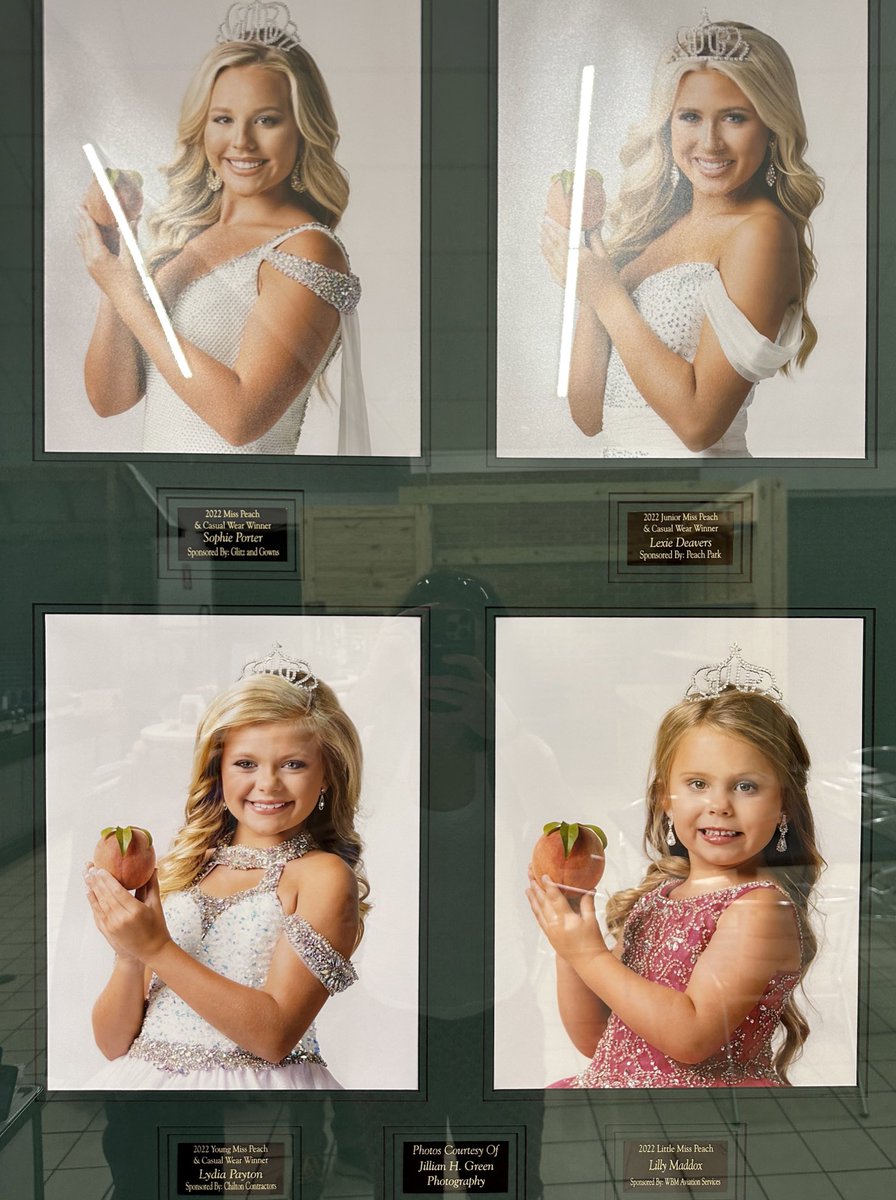
Alice Evans@_alice_evans
Mar 10, 2023
52 tweets
Americans can be divided into 7 tribes. hiddentribes.us
They have polarised values.
This data helps me understand why many Republicans voters and media oppose feminism.
It’s associated with so many values inimical to their own.
Plus, so many live in echo chambers


Devoted conservatives & progressive activists have opposite values.
Devoted conservatives tend to champion:
- submitting to authority
- group loyalty
- purity (abhor things that evoke disgust).
Progressive activists emphasise equality & protecting the vulnerable.
These two polarised wings have radically different views on gender, hard work, patriotism, and public welfare.
Feminism is thus tribal.
Feminism is exclusively championed by those who disavow patriotism, who promote public welfare, & deny America’s greatness
So passionate feminists who speak out on sexism usually say a whole bunch of other things that most Americans dislike.
Accordingly, they’re highly unlikely to get much airtime on conservative news channels.
There’s very little crossover, which probably perpetuates polarisation
Progressive activists overwhelmingly say that “some people’s situations are so great that no amount of work will allow them to find success”.
Devoted conservatives say the exact opposite: “people who work hard can find success no matter what situation they were born into”.
Devoted conservatives thus champion individual responsibility and oppose affirmative action.
This helps explain opposition to group based lobbying for women politicians
They think each individual should make it on their own merit
Perspectives on feminism are also mediated by media & place-based echo chambers.
In highly conservative places - where almost everyone stresses authoritarianism, loyalty and disgust - you’re highly unlikely to encounter the “progressive activists” who champion feminism.
In conservative news & towns, you may not directly hear liberal views.
Feminists will rarely be encountered directly
But via hearsay, as hateful caricatures,
eg foxnews.com/opinion/femini
This helps explain why 92% of the “devoted conservatives” believe that feminists just attack men.
But these devoted conservatives only comprise 6% of the population.
On the other extreme, 96% of progressive activists believe that feminists fight for important issues.
Progressive activists & devoted conservatives also have polarised views on the pervasiveness of sexual harassment
The rest of the US is more moderate.
Democrats actually underestimate how many Republicans recognise the prevalence of sexism
cc @Alessandra Voena
perceptiongap.us
Republicans likewise underestimate the share of Democrats who think that men should be protected for false accusations.
Meaning, Republicans often presume that “the other side” isn’t concerned by false accusations, whereas in fact they often are
Both polarised wings have radically incorrect views of what the other side thinks.
cc @Alessandra Voena
The more news people watch, the more distorted their views of what “the other side” thinks
(This is what I was saying about news snd place based echo chambers)
People who listen to Sean Hannity & Rush Limbaugh have an especially distorted views of what other progressives think.
Devoted conservatives thus watch conservative media, which then tends to portray feminists as man-hating.
Education also WORSENS the perception gap, by creating echo chambers.
College educated Democrats have very few Republican friends. So they don’t really understand what they think.
Non-college graduates are more knowledgeable about what people think.
Highly educated Democrats tend to have very few Republican friends.
This segregation perpetuates the perception gap.
This also means that very few Republicans will be personal friends with feminists; their encounters will not be direct but based on hearsay.
Social media may also contribute to the perception gap
(in addition to friendship groups and place based segregation).
Those who have recently posted political content are more likely to have incorrect views of what others think.
Why does the Perception Gap matter?
People with large Perception Gaps tend to describe their opponents as “hateful,” “ignorant” & “bigoted”.
This breeds polarisation.
Politically engaged Americans consume media that portrays the other side as extreme, which worsens antipathy.
Anti-feminism is thus part of a larger ecosystem of ideological polarisation, a partisan gap & distrust.
Both Ds & Rs tend to see their opponents as extremists & feel threatened by each other.
This is amplified by media & politicians that benefit from outrage & conflict.
Big political machinery thus amps up the partisan gap.
The more involved people are in politics, the greater they misjudge the other side.
These graphs only show a correlation, ofc, but I wager there’s a causal relationship.
People who read the New York Times and other liberal media tend to have a large perception gap, they do not understand devoted conservatives.
It’s not just that Ds & Rs don’t understand each other’s beliefs.
Extremists tend to see each other as hateful
Hateful perceptions are directly correlated with a perception gap
The greater the misperception, the stronger the hate.
To give a concrete example from my own research: Republican women often describe feminists as “angry”, trying to “cut men down”, “emasculate men”.
In 2018, the 7 tribes had very different priorities.
Devoted conservatives prioritised the economy & immigration.
Progressive activists are much more concerned by healthcare, dislike of Trump & climate change.
Addendum:
An organiser for Republican women leaders recently explained to me that this partisan gap in political priorities affects support for female leaders.
Republicans typically care about the economy & security, which are both stereotyped as masculine.
The partisan gap is also driven by the fact that the people with the most extreme views are most vocal and most political active.
Moderates are much more disengaged
Progressive activists are not like the average American.
They’re politically active, they’re three times more ashamed to be an American, they’re likely young & college graduates.
Devoted conservatives are not the average American!
They’re more politically active, they want a U.S.-Mexico wall, they typically give tythe, oppose compromise, and are usually older and slightly more likely to come from the South.
So, if you’re in an anti immigration ecosystem, you’re mostly associating with conservatives.
You’re unlikely to hear opposing viewpoints directly, only as hearsay or as caricatures.
Same holds for religion.
Huge polarisation
If you’re only associating with conservatives (who prioritise the economy, immigration & security), you’re highly unlikely to hear from feminists.
I think this helps explain why male conservatives are typically unaware of obstacles faced by women in work.
The stronger their white identity, the more Americans champion
- a strong leader
- patriotic athletes
- confederate memorials
- deportation of illegal immigrants.
(Item 1 is consistent with @Philip Gorski & @Samuel Perry’s new book, the Flag & the Cross).
Progressives are much LESS likely to see the world as dangerous.
This seems consistent with @Michele J. Gelfand’s argument that existential threats drive in-group solidarity, conformity, policing & authoritarianism.
(It seems at odds with @Matthew Yglesias on liberal teens)
Parenting style is an underestimated driver of cultural persistence.
Conservatives tend to emphasise strict parenting.
(From my own research, I see that the more that parents I still deference the less their children question their values, unless they go off to uni/ cities)
Quantitative on gender attitudes often look at the extent to which they are predicted by individual characteristics (like workforce participation)
But this report shows that beliefs are more bundled & reinforced by polarised ecosystems.
America’s political divisions are based on differences in core moral beliefs.
People’s stance on moral values (like authority, care, loyalty and fairness) strongly predict all their other political beliefs.
American tribes differ in how much they believe that success is shaped by situation at birth vs hard work
The more that Americans recognise structural obstacles, the more they tend to emphasise racial sensitivity oppose police brutality & question BLM.
These two sets of beliefs are probably mutually reinforcing.
Those who believe in social mobility tend to be blind to racism.
Conservatives (who typically deny racism) oppose race-based affirmative action.
Conservatives also tend to oppose affirmative action for women leaders.
I see 3 possible causes:
- affirmative action is toxic, given its association w race
- conservatives believe in hard work, so don’t see sexist obstacles
- Cs don’t mind the absence of women leaders
Evidence for both 2 + 3:
Devoted conservatives
- are not remotely frustrated by sexism
- tend to deny sexism.
77% of devoted conservative men believe that women are more protected.
Only 22% of conservative women believe that men are more protected.
So devoted conservatives believe that it’s men who are under attack.
Remember, this group is very politically active.
This will shape moderates’ and conservatives’ understanding on feminism.
They’ll hear from those who truly believe men are being persecuted.
Patriotism is a good example of ideological bundling, polarisation and hate.
Devoted conservatives are proud to be Americans, this is an important part of their identity and they see feminists as hating the flag.
Disclosure:
I am not remotely patriotic; the concept makes zero sense to me.
Why on earth would I care or take pride in what other people did just because we were born on the same land mass?
I can understand how this might irk someone who is proudly British. 

Americans think that society is polarised & tend to overestimate opposition.
So when out about with those diverse others, over half of Americans say they self-censor themselves on immigration, race, gender & Islam .
Where are the place based ideological bubbles?
Devoted conservatives are seldom found in cities, especially not the north east.
Progressive activists are more likely to live in cities.
Devoted conservatives are not “left behind”!!
Their annual household income is actually very similar to progressive activists.
(If you consider that they’re slightly more likely to live outside cities & in the south, then they’re also getting cheaper land).
The fact that American attitudes aren’t correlated with wealth or geography points instead to the influence of media.
The Birth of a Nation & other media may have cultivated white supremacy (2 papers below)
-which is now bundled up with authoritarianism & opposition to feminism
American views on gender aren’t just a product of material circumstances
They need to be understood within a wider ideological, media, place-based ecosystem of conservativism, which amplifies polarisation.
Points if you can guess where I’ve come..
@Thread Reader App unroll

Alice Evans
@_alice_evans
Asst Prof @KingsIntDev @Yale
Writing the book, ‘The Great Gender Divergence’ with @PrincetonUPress
https://t.co/3jwSTSDAW9
Missing some tweets in this thread? Or failed to load images or videos? You can try to .















































